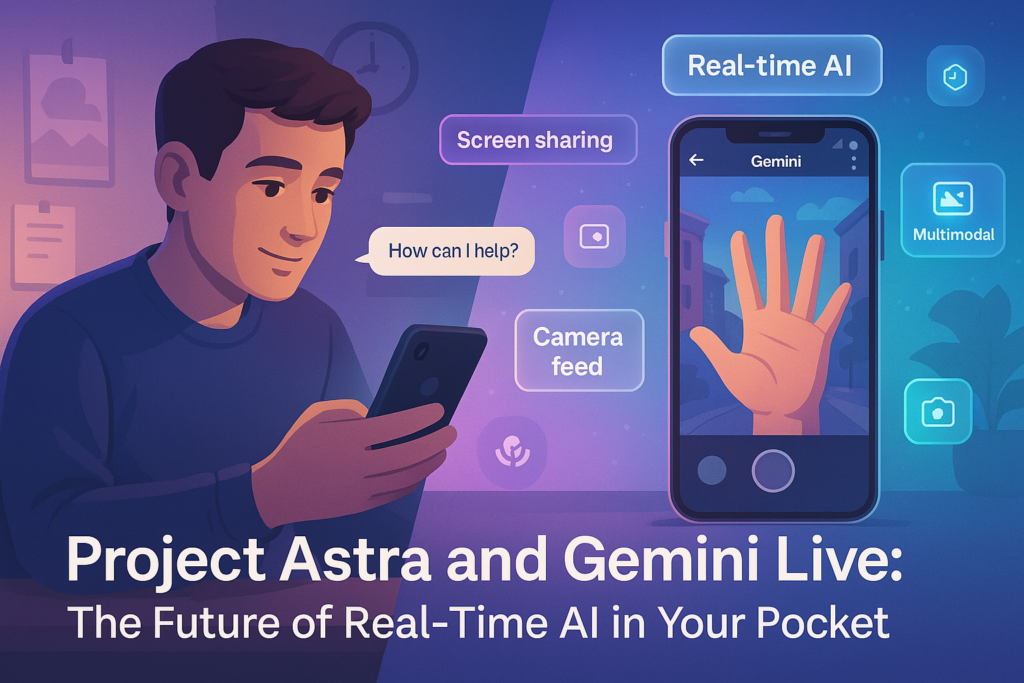Project Astra and Gemini Live: The Future of Real-Time AI in Your Pocket

Introduction
Google has just taken a huge leap forward in the AI race with the rollout of Project Astra inside Gemini Live. This innovation blends real-time visual AI, advanced multilingual conversations, and on-screen interaction into one seamless mobile experience. Available for Pixel 9 and Galaxy S25 users, this marks a new era where your phone doesn’t just search the web – it sees, understands, and responds in real time.
What is Project Astra?
Project Astra is Google’s new initiative to bring real-time visual AI to your smartphone. It allows you to:
- Point your phone’s camera at any object or scene
- Ask questions in real time
- Receive contextual, multilingual responses
Whether it’s identifying street signs, counting fingers, or recognizing products, Astra uses a snapshot-based model to provide instant feedback with human-like conversation.
Gemini Live: Key Capabilities
Gemini Live integrates directly into smartphones, offering:
- Live camera-based analysis
- Conversational AI with natural responses
- Multilingual support
- Device-based access without extra subscription (for Galaxy S25 users)
This means you can simply open your camera, point at something, and ask your phone about it – without needing a premium plan.
Compatibility and Access
Currently, these features are being rolled out on:
- Samsung Galaxy S25 – Full access to Gemini Live at no extra cost
- Google Pixel 9 – Varying access depending on Gemini Advanced subscriptions or promotions
It’s not yet clear if the no-cost access is permanent or promotional. However, this collaboration between Samsung and Google hints at tighter AI integration in upcoming devices.
How Screen Sharing Enhances AI Interaction
Gemini also supports screen sharing within the app, letting the AI:
- Read and summarize articles in real time
- Compare products while you browse
- Highlight key data points or links
- Switch between live camera and screen effortlessly
This allows users to use AI assistance while multitasking across apps or real-world environments.
Multimodal AI in Search
Google’s new AI search experience enables:
- Analyzing both text and images at the same time
- Identifying content using Google Lens
- Breaking images into subqueries for more relevant answers
Examples include:
- Taking a photo of a bookshelf to generate a curated reading list
- Uploading a chart or product image and getting contextual answers
This is designed to make search feel more like talking to a personal assistant than typing into a search box.
Concerns from Independent Publishers
Some publishers are raising red flags. The AI’s ability to summarize content:
- Reduces click-through rates to original articles
- Sometimes gives inaccurate or unsafe advice
Google claims this is not the main reason behind reduced traffic, pointing to seasonal trends and evolving user behavior. Still, smaller content creators worry that AI overviews may cannibalize their visibility.
AI Pricing & Gemini 2.5 Pro
Gemini 2.5 Pro has launched with:
- Wider public access through Google AI Studio
- Cheaper API pricing:
- $1.25 per million input tokens under 200k usage
- $10 per million output tokens
- Higher pricing for usage beyond that
This strategy aims to attract developers and compete against OpenAI and Anthropic, offering scalable, cost-effective computing.
AI Ethics and AGI Risk
DeepMind’s recent paper addressed risks of powerful AI systems:
- Misuse
- Misalignment with human values
- Operational mistakes
- Structural failures
Proposed safety measures:
- Restricted access to high-level AI tools
- More rigorous monitoring
- Broad societal involvement in governance
Demis Hassabis, CEO of DeepMind, emphasized that AGI will be transformative for science and medicine, but must be managed responsibly.
Final Thoughts
Project Astra and Gemini Live are pushing boundaries in mobile AI interaction. Whether you’re pointing at real-world objects or sharing your phone screen, AI is no longer just reactive – it’s becoming proactive and intuitive. The future of visual search, real-time assistance, and mobile AI is unfolding fast. And it starts with a camera and a question.
FAQs
Q1: What is the difference between Gemini Live and Project Astra?
Gemini Live is the feature set; Project Astra is the overarching initiative enabling real-time visual AI.
Q2: Do I need a subscription for Gemini Live?
Not on the Galaxy S25. Pixel 9 users may need Gemini Advanced depending on their access tier.
Q3: Is screen sharing with AI safe?
Yes. The camera shuts off when the session ends, and toggling is manual for user control.
Q4: Will Gemini replace traditional search?
No, but it aims to enhance it with conversational, visual, and multimodal inputs.
Q5: Can small websites lose traffic because of Gemini AI summaries?
Yes. Some site owners report reduced clicks, although Google attributes this to multiple causes.